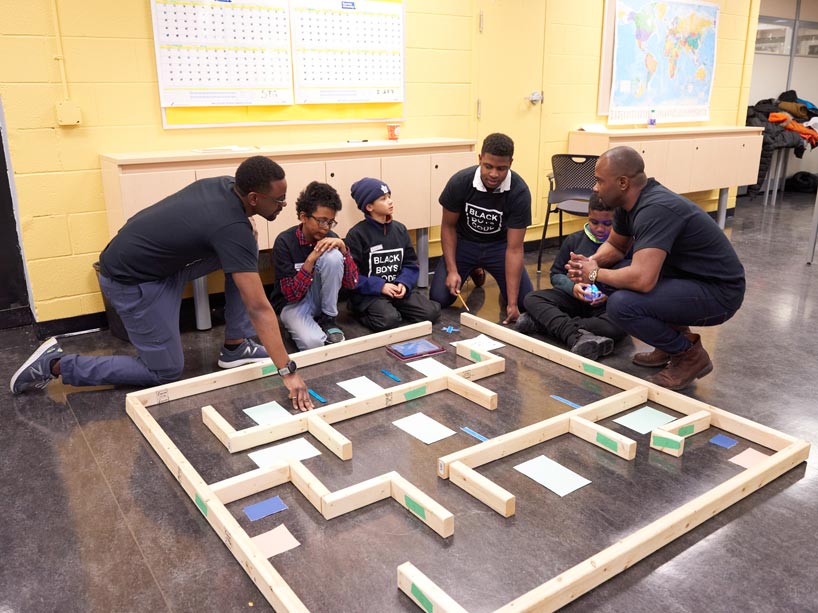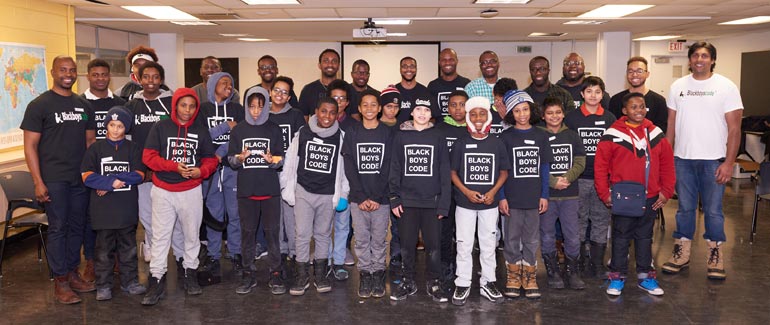The next generation of coding superheroes

Youths and workshop leaders problem-solve at the Black Boys Code hackathon. Photo credit: Howard Prendergrast.
Being the only one in any situation can be a lonely journey. It’s also one that’s become a perpetual way of being for many Black Canadians who work in the science, technology, engineering and math (STEM) field.
“I’ve just gotten so used to being the only Black one in the room,” says Jason Matthews (business tech management ’11).
Matthews is the Toronto chapter leader of Black Boys Code, a not-for-profit organization dedicated to introducing young Black boys to computer science through mentorship and training, and to reversing the dominant whiteness of the Canadian tech landscape. A room that, Matthews says, they’re trying to fill.
On Saturday, March 2, Ryerson University’s Spanning the Gaps outreach initiative partnered with Black Boys Code to host a one-day hackathon, during which a cohort of 16 or so children, ages 8 to 13, collaborated on an intensive technology workshop.
"Spanning the Gaps is thrilled to partner with Black Boys Code on this important event. Through promoting awareness of the importance of education, the program seeks to empower members of underrepresented communities to reach their long-term learning goals," said Marie Bountrogianni, dean of The Chang School. "We hope this event inspires more Black youth to pursue a career in the STEM field."
In groups of three or four, the students were tasked with programming small, orb-shaped robots to roll through obstacle courses, accumulating as many points as they could along the way. (The inevitable chorus of “WAKANDA FOREVER!” from the popular movie, Black Panther, occasionally slipped out from one eager teammate and another, and was usually answered with other kids crossing their arms against their chests like coding superheroes).

The group of junior coders at the hackathon. Photo credit: Howard Prendergast.
The point of the session, says Ryan Hunter, one of the programming instructors, turns out to be multi-pronged. “Not only does it serve to teach basic coding, it also doubles as a way of getting kids to think critically and to work together and solve problems.”
Matthews adds, “It’s important for a program like this to be available. Without it, a lot of these kids wouldn’t even know this is a potential avenue for them. This kind of guidance isn’t really available to Black boys.”
Black Boys Code was founded in 2015 by Bryan Johnson who, throughout his career in telecommunications and technology, also strained to find people who looked like him working in his field. So for the last three years, with the help of volunteers who have careers in STEM, Black Boys Code has hosted events like this across the country.
“When you look for examples of successful Black people in the media, it’s usually in entertainment. You rarely see a Black Zuckerberg, or a Black Bill Gates,” says Jonathon Bloomfield, a chemistry teacher and volunteer at Black Boys Code. “If you don’t see it, you don’t think you can be it. It’s a whole cycle: if people don’t see themselves in a field, they start to wonder, ‘What’s the point anyway? That’s not something that I can do.’”
As the tech economy continues to grow in Canada, Black Boys Code is determined not to let Black people be left behind.
"Black Boys Code is a great program because it shows your skin does not matter,” says Harris Ali, a Grade 8 student and prime minister at Nelson Mandela Elementary School. “Black is beautiful. Some people in this world don't know Black people are special in their own way. We contribute a lot to technology and source coding and all these things. I think that as a Black community, we're looked down on. But we're the next generation."
